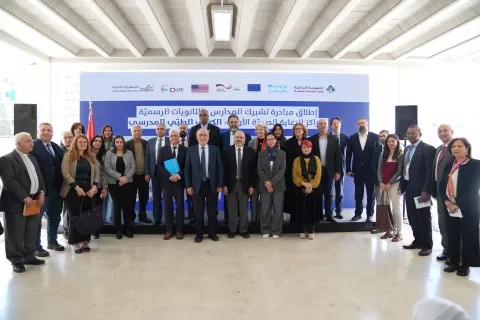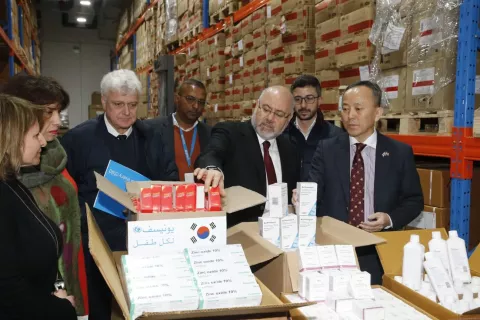The Minister of Public Health in partnership with UNICEF and USAID renew commitment to Universal Salt Iodization programme in Lebanon
“Salt iodization: Protecting early brain development”

- Available in:
- English
- العربية
29 February 2024, Beirut – The Ministry of Public Health (MOPH) in partnership with UNICEF and the United States Agency for International Development (USAID), announced the revitalization of the Universal Salt Iodization programme to combat iodine deficiency disorders, safeguarding the wellbeing and development of children and the population in Lebanon.
In recent years, due to the chronic economic crisis and the interruption of quality assurance mechanisms and supervision of salt iodization in Lebanon, it is expected that the quality of the program has suffered more, pressing both public and private entities to fulfil their accountabilities to maintain the quality of the programme in Lebanon. The Universal Salt Iodization programme is the most effective strategy to address the public health impact of inadequate iodization. In Lebanon, the aim is to set regulatory compliance to national standards for iodization and to reactivate quality control mechanisms in salt production and food manufacturing to maximize the quality and coverage of salt iodization in the country.
Minister of Public Health, Feras Abyad stated: “The ministry has a wealth of data linked to the salt iodization and we are looking forward to the LIMA study to complement it. We have developed with the nutrition sector, a national nutrition strategy that allows us to align all our efforts and focus on different projects like the one we are launching today. The collaboration we have today between different stakeholders from the public sector, private sector, local communities, industries, along with international partners is ensuring better implementation and healthier future and a better tomorrow”.
Inadequate iodine intake during pregnancy can result in enduring brain impairment, potentially diminishing a child's IQ by 8-10 points. Similarly, even a moderate deficiency during school age can lead to a decrease in IQ by 3-5 points. Global evidence has proven that incorporating minute amounts of iodine into salt presents a cost-effective solution to this issue. Each dollar invested in safeguarding children's cognitive development through salt iodization yields a $30 impact.
USAID Lebanon Mission Director Julie Southfield, stated, “The United States is proud to be supporting UNICEF and the Ministry of Public Health in the critical endeavour to revitalize the salt iodization program in Lebanon. We remain committed to helping meet Lebanon’s humanitarian needs and advancing its development goals. Aligned with the Ministry and UNICEF, we are dedicated to ensuring every child has the opportunity to thrive and succeed.”
“The nutrients a child receives in the earliest years of life influence their brain development for life and can make or break their chance of a prosperous future. UNICEF has been committed to support Lebanon in the implementation of the Universal Salt Iodization project since 1995, safeguarding the growth and wellbeing of children” said Edouard Beigbeder, UNICEF Representative in Lebanon. “In recent years, the economic crisis affected the effectiveness of iodization procedures in Lebanon, as well as the need for comprehensive guidance for manufacturers. Today, thanks to the generous funding from USAID, UNICEF together with MOPH, MOET, AUB and Iodine Global Network are revitalizing the Universal Salt Iodization project in Lebanon”, he added.
Dr Omar Obeid Professor of Nutrition from AUB and IGN coordinator in Lebanon said: “Iodine deficiency was identified as a public health problem in Lebanon since the early 1960s. In 1971, the nation enforced salt iodization as a mandate, yet faced challenges in implementation due to instability and inadequate monitoring. Presently, Lebanon has a distinctive chance to enhance its iodine levels, given that a majority of salt production is concentrated within a few factories”
The latest nationwide data available goes back to 2013-2014, hence, to renew our baseline, MOPH with support of UNICEF and multiple nutrition partners, implemented the first ever National Micronutrient and Child Development (LIMA) Survey in 2023. The Preliminary results from the LIMA indicate that approximately 90 per cent of the fine table salt used in households in Lebanon is not adequately iodized and, more shockingly, 1/3 of the fine table salt used by households in Lebanon is not iodized at all. Consequently, adolescent girls and women living in households where salt is not iodized at all, or not adequately iodized, are significantly Iodine deficient.
Due to the collective efforts of government of Lebanon, industry, UNICEF, USAID, AUB and IGN, we are on the verge of being able to ensure sustainable iodine intakes for all children in Lebanon.
About UNICEF
UNICEF works in some of the world’s toughest places, to reach the world’s most disadvantaged children. Across 190 countries and territories, we work for every child, everywhere, to build a better world for everyone. For more information about UNICEF and its work for children visit www.unicef.org/lebanon/.
Follow UNICEF Lebanon on Facebook, Twitter, Instagram, LinkedIn, YouTube and TikTok.




